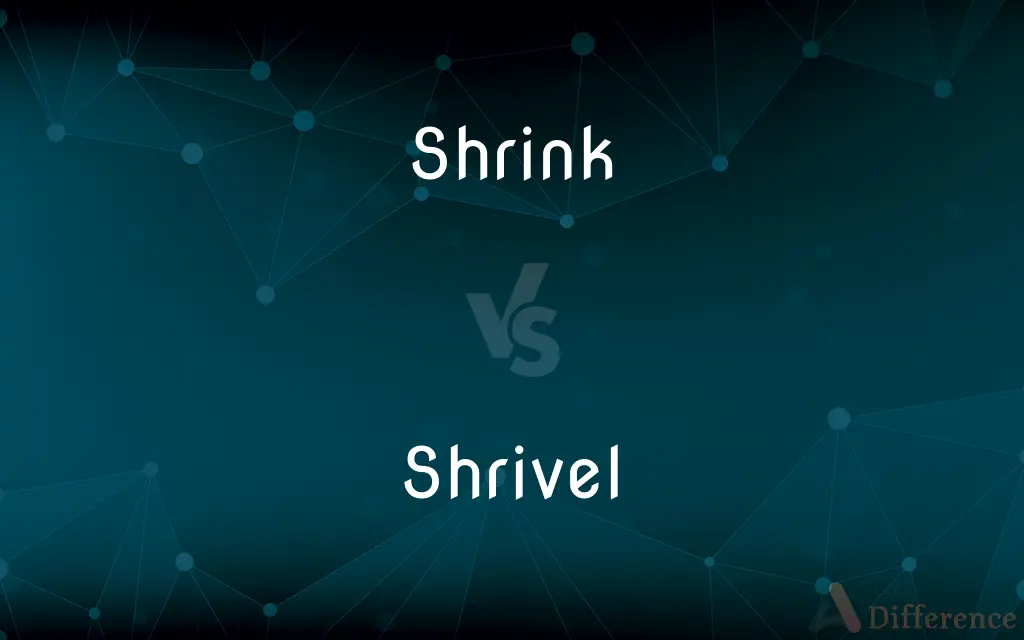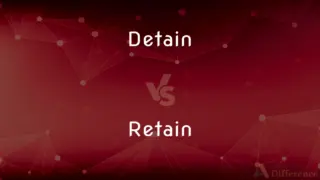Shrink vs. Shrivel — What's the Difference?
By Urooj Arif & Maham Liaqat — Updated on April 28, 2024
Shrink generally refers to reduction in size due to external forces like heat, while shrivel describes the wrinkling or withering typically from loss of moisture.

Difference Between Shrink and Shrivel
Table of Contents
ADVERTISEMENT
Key Differences
Shrink typically refers to a decrease in size, often due to external factors such as heat or pressure. On the other hand, shrivel usually denotes a specific type of shrinking characterized by a wrinkled or withered appearance, often resulting from drying out.
Materials like fabrics and plastics may shrink when exposed to high temperatures during washing or drying, reflecting a change in dimensions. Whereas, organic materials like fruits or leaves tend to shrivel as they lose moisture, leading to a more pronounced textural change.
Shrinkage in textiles is usually undesirable and often prevented through specific treatments or washing instructions. Conversely, shriveling is a natural process for many biological items, reflecting ecological and biological changes.
Psychological or metaphorical use of "shrink" implies a decrease in emotional or physical presence, such as shrinking from responsibility. In contrast, "shrivel" is rarely used metaphorically and focuses more on physical descriptions of objects losing their vitality.
In the culinary context, meats and vegetables may shrink due to heat causing moisture loss and fat rendering. On the other hand, shriveling is commonly observed in aging or improperly stored produce, impacting texture and flavor.
ADVERTISEMENT
Comparison Chart
Definition
Reduce in size due to external influences
Wither or wrinkle due to moisture loss
Typical Usage
Fabrics, plastics
Organic materials, like fruits and leaves
Result
Smaller size, maintained structure
Smaller size, wrinkled or withered appearance
Desirability
Often undesirable in textiles
Natural or negative in biological contexts
Metaphorical Use
Emotional or physical presence decrease
Rarely used metaphorically
Compare with Definitions
Shrink
Reducing size under heat.
The sweater will shrink if washed in hot water.
Shrivel
Textural change due to drying.
The paint shriveled as it dried, leaving a cracked surface.
Shrink
Contraction of materials.
Plastics shrink when exposed to excessive heat.
Shrivel
Loss of moisture leading to wrinkling.
The leaves shrivel up in the hot sun.
Shrink
Decrease in volume or mass.
The company's profits shrink every quarter.
Shrivel
Aging process in fruits.
The grapes shriveled into raisins.
Shrink
Psychological reduction.
Feeling smaller or less confident, she shrank in her chair during the meeting.
Shrivel
Withering of organic matter.
Without enough water, the plant began to shrivel.
Shrink
Withdraw or pull away.
He tends to shrink from making tough decisions.
Shrivel
Effect of dehydration on skin.
His skin shriveled after years of working in the desert.
Shrink
To become or appear to become smaller
The shadows shrank as the sun rose higher. The mountains shrank in the distance as we drove away.
Shrivel
To become or make shrunken and wrinkled, often by drying
Leaves die, fall, and shrivel. The heat shriveled the unwatered seedlings.
Shrink
To become smaller from exposure to heat, moisture, or cold
The sweater shrank in the wash.
Shrivel
To lose or cause to lose vitality or intensity
My enthusiasm shriveled as the project wore on. Inflation shriveled the buying power of the dollar.
Shrink
To become reduced in amount or value; dwindle
His savings quickly shrank. The market for that product has been shrinking.
Shrivel
To become or make much less or smaller; dwindle.
Shrink
To move back or away, especially in fear
"She shrank back against the wall and flattened her palms against it" (Pearl S. Buck).
Shrivel
(intransitive) To collapse inward; to crumble.
The plant shrivelled from lack of water.
Shrink
To show reluctance; hesitate
We should not shrink from making such a sacrifice.
Shrivel
(intransitive) To become wrinkled.
His fingers were shriveled from being in the bath for too long.
Shrink
To cause to shrink
The treatment shrank the tumor.
Shrivel
(transitive) To draw into wrinkles.
The hot sun shrivelled the leaves.
Shrink
The act of shrinking.
Shrivel
To draw, or be drawn, into wrinkles; to shrink, and form corrugations; as, a leaf shriveles in the hot sun; the skin shrivels with age; - often with up.
Shrink
The degree to which something shrinks; shrinkage.
Shrivel
To cause to shrivel or contract; to cause to shrink onto corruptions.
Shrink
(Slang) A psychotherapist.
Shrivel
Wither, especially with a loss of moisture;
The fruit dried and shriveled
Shrink
(transitive) To cause to become smaller.
The dryer shrank my sweater.
Shrivel
Decrease in size, range, or extent;
His earnings shrank
My courage shrivelled when I saw the task before me
Shrink
(intransitive) To become smaller; to contract.
This garment will shrink when wet.
Shrink
(intransitive) To cower or flinch.
Molly shrank away from the blows of the whip.
Shrink
(transitive) To draw back; to withdraw.
Shrink
To withdraw or retire, as from danger.
Shrink
(intransitive) To move back or away, especially because of fear or disgust.
Shrink
Shrinkage; contraction; recoil.
Shrink
A psychiatrist or psychotherapist.
You need to see a shrink, you crazy fool.
My shrink said that he was an enabler, bad for me.
Shrink
Loss of inventory, for example due to shoplifting or not selling items before their expiration date.
Shrink
To wrinkle, bend, or curl; to shrivel; hence, to contract into a less extent or compass; to gather together; to become compacted.
And on a broken reed he still did stayHis feeble steps, which shrunk when hard thereon he lay.
I have not found that water, by mixture of ashes, will shrink or draw into less room.
Against this fire do I shrink up.
And shrink like parchment in consuming fire.
All the boards did shrink.
Shrink
To withdraw or retire, as from danger; to decline action from fear; to recoil, as in fear, horror, or distress.
What happier natures shrink at with affright,The hard inhabitant contends is right.
They assisted us against the Thebans when you shrank from the task.
Shrink
To express fear, horror, or pain by contracting the body, or part of it; to shudder; to quake.
Shrink
To cause to contract or shrink; as, to shrink finnel by imersing it in boiling water.
Shrink
To draw back; to withdraw.
The Libyc Hammon shrinks his horn.
Shrink
The act shrinking; shrinkage; contraction; also, recoil; withdrawal.
Yet almost wish, with sudden shrink,That I had less to praise.
Shrink
A psychiatrist.
Shrink
A physician who specializes in psychiatry
Shrink
Wither, especially with a loss of moisture;
The fruit dried and shriveled
Shrink
Draw back, as with fear or pain;
She flinched when they showed the slaughtering of the calf
Shrink
Reduce in size; reduce physically;
Hot water will shrink the sweater
Can you shrink this image?
Shrink
Become smaller or draw together;
The fabric shrank
The balloon shrank
Shrink
Decrease in size, range, or extent;
His earnings shrank
My courage shrivelled when I saw the task before me
Common Curiosities
Is shriveling always a negative process?
While often negative, shriveling can be beneficial in processes like making raisins from grapes where it is desirable.
Can all types of shrinkage be prevented?
Not all types can be completely prevented, but careful laundering and handling can minimize shrinkage.
What are the implications of shrinkage for clothing manufacturers?
Manufacturers need to account for potential shrinkage when designing and fabricating clothing to ensure fit remains accurate after washing.
How can consumers test for shrinkage in fabrics before purchasing?
Consumers can look for care labels that indicate whether the fabric has been pre-shrunk or if specific washing instructions need to be followed.
Are there any health-related uses of the concept of shriveling?
Yes, medical professionals might refer to shriveling of the skin or other tissues in diagnosing dehydration or certain skin conditions.
Why do organic materials shrivel?
Organic materials shrivel primarily due to loss of moisture, which causes cells to collapse and the material to wrinkle.
What industries are most concerned with shrinkage?
The textile and retail industries are particularly concerned with shrinkage due to its impact on product quality and inventory accuracy.
What are the psychological implications of someone shrinking from a challenge?
This may indicate anxiety, low confidence, or a lack of preparation to face challenges.
What are common materials that tend to shrink?
Common materials that shrink include cotton, wool, and certain synthetic fabrics.
What home remedies can help reduce the effects of shriveling in plants?
Regular watering, appropriate sunlight, and using humidity trays can help reduce shriveling in houseplants.
Can shrinking and shriveling be used interchangeably in any context?
No, these terms are not generally interchangeable as they refer to different processes and contexts.
What steps can be taken to prevent shriveling in stored agricultural produce?
Proper humidity control, temperature management, and using moisture-preserving packaging materials can prevent shriveling.
How does temperature affect the rate of shriveling in food?
Higher temperatures generally accelerate moisture loss, increasing the rate of shriveling.
How does fabric composition influence its tendency to shrink?
Fabrics with natural fibers like wool and cotton are more prone to shrinkage compared to synthetic fibers, which are more stable.
What is the role of shrinkage in the logistics and shipping industry?
In logistics, shrinkage can refer to the loss of inventory or cargo volume, which needs to be managed to ensure efficiency and profitability.
Share Your Discovery

Previous Comparison
Manacles vs. Shackles
Next Comparison
Detain vs. RetainAuthor Spotlight
Written by
Urooj ArifUrooj is a skilled content writer at Ask Difference, known for her exceptional ability to simplify complex topics into engaging and informative content. With a passion for research and a flair for clear, concise writing, she consistently delivers articles that resonate with our diverse audience.
Co-written by
Maham Liaqat















































